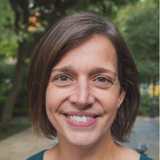The COVID-19 pandemic has wreaked global economic havoc that will have research funding repercussions for years, particularly impacting LMICs. At the same time, much of the world faces ongoing and future challenges to cancer control, ranging from a lack of healthcare resources and capacity, to shortfalls in effective prevention, to exposure to systemic disruption from violence conflict or anomalous weather events relating to climate change. This presentation highlighted that global health strategies in cancer research must adapt to these complex challenges by empowering and giving voice to those who understand where resources can be best placed to make a difference to cancer burden in the LMIC context.”
Dr Louis Fox, Research Associate
27 October 2022
King's researchers chair session exploring pandemic impact on cancer research priorities
Professors Mieke Van Hemelrijck and Professor Richard Sullivan chaired a highlight session exploring the impact of COVID-19 on cancer research priorities at the World Cancer Congress 2022 in Geneva this month.

Professor Van Hemelrijck, Professor in Cancer Epidemiology, and Professor Sullivan, Director of the Institute of Cancer Policy and Co-Director of the Centre for Conflict & Health Research, hosted the session, which focused on the REPRISE study. The REPRISE study aims to formalise a set of priorities for cancer research in lower- and middle-income countries (LMICs) in the emergent context of the challenges wrought by the COVID-19 pandemic.
During the presentation section, which was led by Dr Louis Fox, global cancer experts from LMICs who had contributed to the study were provided with empirical insights into the impacts of the pandemic on cancer research and care. They were also informed about a number of pre-defined research priorities that had been produced by a cancer and COVID-19 Global Task Force. They were subsequently asked to come up with their own additional research priorities, and then to compare all 54 cancer research priorities (and 21 further COVID-19 and cancer-related priorities) against one another in terms of their relative importance.
Across the range of important priorities, the highest priority area was ‘Research into strategies to adapt guidelines or treatment strategies in line with the availability of medical resources, particularly systemic therapy’. The highest COVID-19 and cancer-related priority area was ‘Strategies to incorporate what has been learned during the pandemic that can be maintained posteriorly, for example telemedicine and shortened treatments’.
In addition to the Highlights Session, and Professor Sullivan led three major sessions on conflict and cancer. One session saw collaboration with teams from north-west Syria, Lebanon, Jordan, Turkey and Mexico to examine the complex needs of cancer patients in conflict from a range of perspectives. This presentation also explored the challenges of delivering cancer care in the Ukraine conflict.
The King’s team also presented the results of a virtual reality (VR) surgical simulation programme focusing on elimination of cancer of the cervix. Researchers, in partnership with VR experts at the Southern Methodist University, USA and Groesbeck Parham Zambia, Cancer Diseases Hospital, presented updates to a prospective trial on the application of virtual reality surgical simulation for a wide variety of pelvic and surgical procedures, including total abdominal hysterectomy (for cancer cervix), simple hysterectomy and C-section for reproductive and maternal health. This development will produce a significant and low-cost augmentation for surgical training for surgeons in LMIC conducting open procedures.
The World Cancer Congress, which takes place every two years, aims to strengthen the participants' action and impact on national, regional and international scales through a multidisciplinary programme that features the latest successful interventions in cancer prevention, diagnosis, treatment and care.


